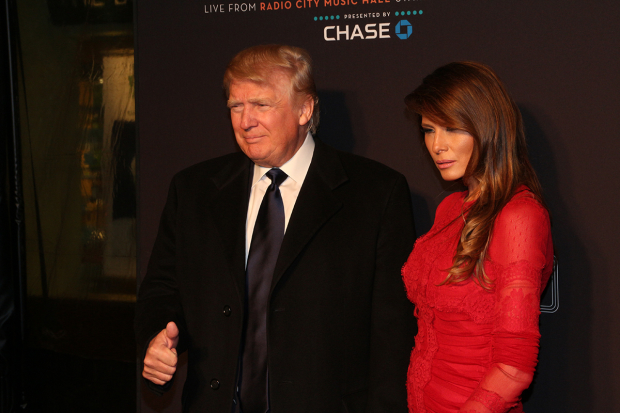Anne Washburn's Shipwreck Puts Trump Onstage in Washington, DC
The 45th president is a prominent character in a new play at Woolly Mammoth from the author of ”Mr. Burns” and ”The Twilight Zone”.
After exploring the apocalypse through the lens of The Simpsons in Mr. Burns, a Post-Electric Play and dissecting Cold War-era fears in her stage adaptation of The Twilight Zone, playwright Anne Washburn is next tackling perhaps the most divisive pop-culture figure in history: President Donald Trump.
Trump is not just on everyone's minds in Washburn's new drama Shipwreck: A History Play About 2017, but he's also a central character — one who extends a dinner invitation that has the potential to change the course of American history.
Washburn is deliberately guarded when it comes to revealing any more details of the work, which has its US premiere in Washington, DC, at the Woolly Mammoth Theatre Company beginning February 10 as a coproduction with the Public. (It had its world premiere last year in a different production at London's Almeida Theatre.) All she'll say is that it's liberating — and hard — to put the president onstage in a way that doesn't make his supporters feel cornered, and she hopes that they're willing to keep their minds open and come see it.

(© Allison Stock)
This interview has been edited and condensed for clarity.
I've read that Shipwreck was partially inspired by the controversy surrounding the Shakespeare in the Park Julius Caesar, where Oskar Eustis made Caesar look and sound like Komrade Cheetoface. Is there any truth to that?
I was going to do a silent playwriting retreat, and what happens is you write a play very quickly from nothing. You don't have time to think it out. I didn't think this would be a play, because how could it be? I just wanted to disgorge the political language and discussions that were building up in me and I was surrounded by. To do anything else, to pretend that this wasn't what I was obsessed with, would be like, why?
I had decided that whatever took place [in the world] — because some crazy thing would always take place — would be a thing that I would meditate on. The last thing that happened as we were all on the van to the retreat was someone had a particular piece of theater gossip about Oskar Eustis being interviewed by the FBI because of the Julius Caesar thing. It wasn't an inspiration, exactly, but it got caught up in everything that happened right before I went into the retreat. By the time I left, seven days later, I had all the elements in the play, even the scenes I hadn't written yet.
It's such a distinctly American play, and yet it premiered at the Almeida in London. How did that happen, and what was it like to work on a play about our political moment in a country that is going through its own major upheaval?
Saheem Ali [the director] and I had sorted out that we would work together. The Public had it in hand; discussions were starting to be had. The Almeida production came out of the blue; Rupert Goold got wind of it and sent me a note saying, "I hear you have a play that is very political," and I said, "Take a look, but it's incredibly American and you don't want it."
I went in thinking it was going to be so interesting to see how it would work in a different country, and I think we all were pleased to be trying to make something out of what was happening right at the moment. They're stuck with our politics. The whole world is living through our political situation whether they want to or not, and they know a lot about it, whether they want to or not. In some ways, it was a way for them to talk about our politics, and in some ways, it was a way to also talk about their current situation with Brexit. There are a lot of parallels, but while they aren't the same, it was close enough to be able to engage with.

(© David Gordon)
Is it liberating, frightening, difficult, all of the above, to create Donald Trump as a character?
Liberating. [Pause] It was very hard. It took a long time to write some of those scenes, because the temptation to make Trump a crazy person was very strong. To write the person of his own fantasy, to write this noble man, was actually hard. I think the task is to truthfully portray the fantasy of himself that he created in the debate where he said that he fought against the Iraq War very hard. Who did he feel that he was at that moment? Later in the play, and I'm being cagey about some of the details, it's not the same figure. It is probably more the Trump that Trump supporters really fantasize about: the person who's able to play 12-deep chess, the man who may be sinister, but is super-cogent and strategic and powerful. The play is interested in exploring the other ways of understanding him, which are not as readily accessible.
Whom is this play geared to? Do you want to encourage Republicans, or even the first family to come see it?
I would love to. It's not just about Republicans, but the proper Trump supporter. I think you would have to take them by the hand and personally invite them. I'm genuinely interested in seeing how they perceive this play and what exactly the response is, without making them feel cornered. Does it in any way speak to them? I think from a liberal theater perspective, it feels like a play that reaches out in terms of how it's trying to think about these things. But I don't know that it will feel that way to an actual Trump supporter, or if it'll just feel like liberal gobbledygook.







